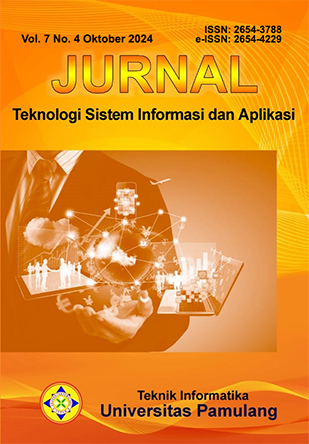Implementasi Metode Extreme Programming untuk Pengembangan Sistem Inventory Sarana dan Prasarana pada Universitas Amikom Purwokerto
DOI:
https://doi.org/10.32493/jtsi.v7i4.44861Keywords:
System; Inventory; Extreme ProgrammingAbstract
Universitas Amikom Purwokerto has not yet implemented a system for the procurement of facilities and assets, inventory, maintenance, supervision, and evaluation processes. All this time, we have been using a letter of request for goods from one division to another and carrying out other processes manually. Therefore, the process of item requisition and inventory requires the development of an inventory system. This research aims to develop a web-based inventory system using the CodeIgnite framework, while the system development method employs Extreme Programming (XP). The results of the research indicate that the use of the CodeIgnite framework and the Extreme Programming method can be utilized for the development of the inventory system at Universitas Amikom Purwokerto, which is used to manage the process of goods requisition and inventory. After conducting black box testing, it was concluded that all system features have been tested, and the results show that the system can operate according to the planning made during the planning stage.
References
Bangun, A. W., Erwansyah, K., & Elfritiani, E. (2022). Sistem Pakar Mendiagnosa Penyakit Mastitis Menggunakan Metode Certainty Factor. Jurnal Sistem Informasi Triguna Dharma (JURSI TGD), 1(2), 80–89.
Cunaya, C., & Apriyansyah, C. (2022). Analisis Perkembangan Sosial Emosional Anak Usia 5-6 Tahun Melalui Asesment Wawancara di TK Cahaya Bintang. Cemerlang: Jurnal Pendidikan Anak Usia Dini, 1(1), 1–9.
Elviera, C. D., Irawan, D., & Syafrina, D. N. (2019). Pengembangan Tata Usaha Sekolah Berbasis Teknologi Informasi. MUKADIMAH: Jurnal Pendidikan, Sejarah, Dan Ilmu-Ilmu Sosial, 3(1), 1–6.
Herlinda, V., Darwis, D., & Dartono, D. (2021). Analisis Clustering Untuk Recredesialing Fasilitas Kesehatan Menggunakan Metode Fuzzy C-Means. Jurnal Teknologi Dan Sistem Informasi, 2(2), 94–99.
Kharisma, D., Saniati, S., & Neneng, N. (2022). Aplikasi E-Commerce Untuk Pemesanan Sparepart Motor Berbasis Web Menggunakan Framework Codeigniter. Jurnal Teknologi Dan Sistem Informasi, 3(1), 83–89.
Mansur, M., & Daryuni, M. (2021). onitoring Sistem Informasi Monitoring Data PGRI Kecamatan Bengkalis Menggunakan Metode Extreme Programming dan Framework Codeigniter. Digital Zone: Jurnal Teknologi Informasi Dan Komunikasi, 12(1), 46–58.
Maulidah, A. (2020). Analisis Proses Pelaksanaan Pembelajaran Keterampilan Tata Boga Membuat “Kue Pastry” bagi Warga Belajar Paket C Kelas XI IPS di SPNF SKB Kota Samarinda. Pepatudzu, 16(2), 71–79.
Nartin, N., & Musin, Y. (2022). Peran Pemerintah Daerah Dalam Meningkatkan Kesejahteraan Masyarakat Dimasa Pandemi Covid-19 (Studi Pada Kantor Camat Tinanggea Kabupaten Konawe Selatan). Sibatik Journal: Jurnal Ilmiah Bidang Sosial, Ekonomi, Budaya, Teknologi, Dan Pendidikan, 1(3), 163–172.
Pratiwi, Y. A., Ginting, R. U., Situmorang, H., & Sitanggang, R. (2020). Perancangan Sistem Informasi Akademik Berbasis Web Di Smp Rahmat Islamiyah. Jurnal Teknologi Kesehatan Dan Ilmu Sosial (Tekesnos), 2(1), 27–32.
Rasapta, D., Qumaruw, S., & Septa, S. (2022). Mengenal Dan Menerapkan Ecommerce Untuk Mengambil Peluang Usaha Untuk Generasi Muda Di SMK Bistek Cibinong. Abdi Jurnal Publikasi, 1(1), 1–5.
Romadhon, M. H., Yudhistira, Y., & Mukrodin, M. (2021). Sistem Informasi Rental Mobil Berbsasis Android Dan Website Menggunakan Framework Codeigniter 3 Studi Kasus: CV Kopja Mandiri. Jurnal Sistem Informasi Dan Teknologi Peradaban, 2(1), 30–36.
Sallaby, A. F., & Kanedi, I. (2020). Perancangan Sistem Informasi Jadwal Dokter Menggunakan Framework Codeigniter. Jurnal Media Infotama, 16(1).
Suwondo, A., Mansur, A. W., & Mardinawati, M. (2023). Penerapan Extreme Programming Dalam Pengembangan Sistem Informasi Penjadwalan Kuliah Jurusan Akuntansi Polines. Jurnal Teknologi Informasi Dan Komunikasi, 14(1), 1–7.
Wahid, A. A. (2020). Analisis Metode Waterfall Untuk Pengembangan Sistem Informasi. Jurnal Ilmu-Ilmu Informatika Dan Manajemen STMIK, 1(1), 1–5.
Widhayani, L., Syahputra, E., & Dewi, A. S. (2022). Pengaruh Kompensasi Finansial Dan Disiplin Kerja Terhadap Produktivitas Kerja Karyawan Di Pt Intisumber Hasil Sempurna (IHS) Kediri. Jurnal Mahasiswa: Jurnal Ilmiah Penalaran Dan Penelitian Mahasiswa, 4(3), 19–35.
Downloads
Published
How to Cite
Issue
Section
License
Copyright (c) 2024 Ranggi Praharaningtyas, Retno Waluyo, Rizki Andika, Nurul Hani

This work is licensed under a Creative Commons Attribution-NonCommercial 4.0 International License.
Authors who publish with this journal agree to the following terms:
- Authors retain copyright and grant the journal right of first publication with the work simultaneously licensed under a Creative Commons Attribution License that allows others to share the work with an acknowledgement of the work's authorship and initial publication in this journal.
- Authors are able to enter into separate, additional contractual arrangements for the non-exclusive distribution of the journal's published version of the work (e.g., post it to an institutional repository or publish it in a book), with an acknowledgement of its initial publication in this journal.
- Authors are permitted and encouraged to post their work online (e.g., in institutional repositories or on their website) prior to and during the submission process, as it can lead to productive exchanges, as well as earlier and greater citation of published work (See The Effect of Open Access).
Jurnal Teknologi Sistem Informasi dan Aplikasi have CC BY-NC or an equivalent license as the optimal license for the publication, distribution, use, and reuse of scholarly work.
In developing strategy and setting priorities, Jurnal Teknologi Sistem Informasi dan Aplikasi recognize that free access is better than priced access, libre access is better than free access, and libre under CC BY-NC or the equivalent is better than libre under more restrictive open licenses. We should achieve what we can when we can. We should not delay achieving free in order to achieve libre, and we should not stop with free when we can achieve libre.
This work is licensed under a Creative Commons Attribution-NonCommercial 4.0 International (CC BY-NC 4.0) License
YOU ARE FREE TO:
- Share - copy and redistribute the material in any medium or format
- Adapt - remix, transform, and build upon the material for any purpose, even commercially.
- The licensor cannot revoke these freedoms as long as you follow the license terms



_2020_-_7(2)_2024_-_Thumbnail.png)












